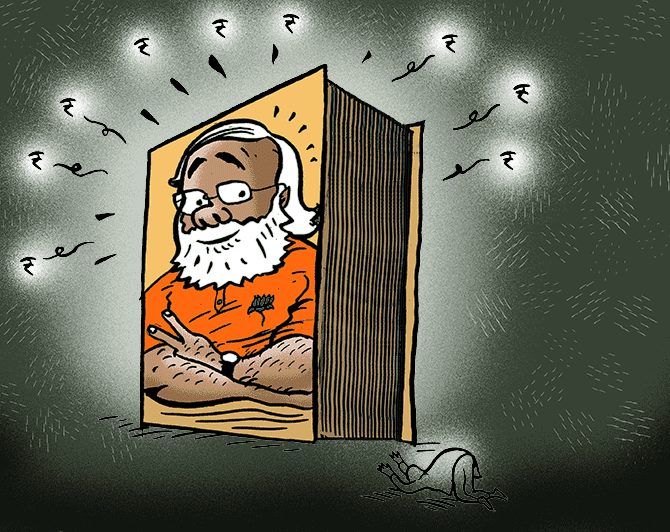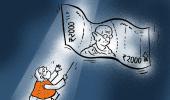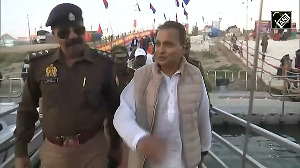'In macroeconomic policy, timing is all, and by leaving things too late, Mr Modi may have made around 50 seats in the Lok Sabha highly vulnerable,' says T C A Srinivasa Raghavan.

Illustration: Dominic Xavier/Rediff.com
When Mr Narendra D Modi became prime minister, he found a massive macroeconomic disaster left behind by the UPA, created by Pranab Mukherjee and P Chidambaram.
Everyone has forgotten just how precarious things were in the summer of 2014, especially Mr Chidambaram who mumbles away monotonously every Sunday.
Mr Modi faced two economic problems which, despite his reluctance to engage with economics, he understood clearly.
The first was inflation, which has serious political consequences; and the second was foreign exchange reserves, which the BJP has always thought of a being a substitute for testosterone.
Inflation, though abating from the previous highs, was still a problem because food prices had risen by over 65 per cent since 2009.
Foreign exchange reserves were under extreme pressure and there was even talk of a 1991 like crisis.
Once he had been properly briefed, Mr Modi appears to have issued three general instructions.
One was to the finance ministry to keep the fiscal deficit down, whatever the cost.
The other two were to the Reserve Bank of India to do whatever had to be done to bring down inflation and to avoid even the whiff of a balance of payments crisis.
Where Mr Modi erred
So that's what the finance ministry and the RBI did and, by early 2016, both problems had been largely resolved.
The basic approach was to deflate the economy and the fiscal deficit, both of which had bloated like a frog in the monsoon under the tender care of the UPA.
Mr Modi's government can be accused of many things, but not poor macroeconomic management, which was helped along hugely by falling oil prices.
It was, moreover, also good political and optics management because people had been exhausted by the Great UPA Inflation of 2009-2013.
But here's where the problem seems to have arisen.
Mr Modi, perhaps because he sees macroeconomic issues only through the twin political lenses of avoiding inflation and avoiding BoP crises, should have revised his general instructions in 2016. But he failed to do so.
Instead, perhaps with the March 2017 Uttar Pradesh assembly election in view, he ordered demonetisation in November which further deflated the economy when it needed to be inflated a bit.
Whereas the earlier policies had deflated it via higher interest rates and low fiscal deficits, demonetisation used the only monetary instrument Mr Modi understood: He simply discarded the old currency.
It took all of 2017 for the economy to recover from the shock.
But now, as T N Ninan pointed out a few days ago, things are starting to go well.
The IMF and the World Bank also concur and believe that GDP in 2018 will grow at around 7.5 per cent.
The question, however, remains: Had Mr Modi had a less political understanding of economic policy -- this flaw has led him to reversing some of the trade liberalisation of the last 25 years -- would he have done better on the investment, work and jobs front?
The answer has to be an unqualified yes.
One might say that all prime ministers have only a political understanding of economics. There is nothing wrong with that and that is how it should be.
Indeed, as Manmohan Singh was fond of saying, as prime minister he was no longer an economist.
But there is an important difference between Mr Modi and his predecessors. While they confined their politics to microeconomic decisions, Mr Modi has done the opposite.
He has taken a political view of macroeconomics -- keep inflation down and exchange reserves and rate high -- and an apolitical view of microeconomics.
This has meant allowing markets to function better than before. He has also reduced subsidies, broadened and widened the tax base, gone after the NPA-wallahs, and brought in other important microeconomic policy changes.
In doing so he has annoyed practically all voters.
These microeconomic policies will show results after a while. But the squeeze he has put on the macro side -- low fiscal deficits, high interest rates and an overvalued rupee -- has had the immediate effect of dampening investment and, therefore, jobs.
In macroeconomic policy, timing is all, and by leaving things too late, Mr Modi may have made around 50 seats in the Lok Sabha highly vulnerable.
Another 50 to 60 seats the BJP would have lost anyway.












 © 2025
© 2025